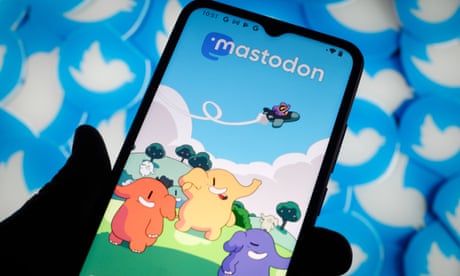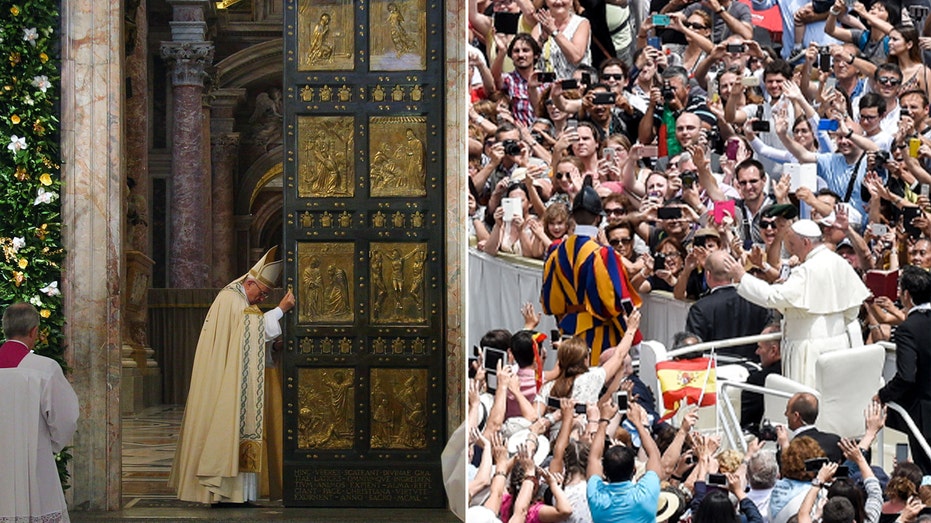- by foxnews
- 24 Nov 2024
Thousands fled to Mastodon after Musk bought Twitter. Are they still ‘tooting’?
Thousands fled to Mastodon after Musk bought Twitter. Are they still ‘tooting’?
- by theguardian
- 19 Apr 2023
- in technology

When Elon Musk bought Twitter nearly six months ago, bringing back white supremacists and booting journalists who had criticized him, many users felt it was the right time to leave the platform.
Thousands of tweeters - myself included - fled to Mastodon: a scrappy social media project designed from its start in 2016 to be resistant against takeovers by billionaires. Mastodon is decentralized: instead of a single website, it's a network of thousands of independently run servers - each with their own moderators and users - who can interact with each other's posts, called "toots", using an open protocol called ActivityPub. Other social media services can connect to ActivityPub as well, so no one app can monopolize the broader network that Mastodon is part of, called the "fediverse".
All that posed a bit of a learning curve. In addition to learning the new terms, I had to carefully choose a server, which would determine who would be in charge of my data, and what toots I would see most often.
Mastodon's creator, a German programmer named Eugen Rochko, told me at the time that his creation could be "slightly more difficult to grasp" than Twitter. "But we're not trying to be an exact copy," he said. "We're trying to make something better."
Musk has appeared threatened at times. In December, he banned links to Mastodon on Twitter and suspended users who posted their Mastodon handles, including Mastodon's official account. Days later, he suddenly reversed course, calling the ban a "mistake" during a Twitter Spaces livestream. "Fucking post Mastodon all goddamn day long, I don't care," he said.
Nearly half a year later, has Mastodon seized the momentum? Data shows that it saw a huge surge of interest late last year: its monthly active users increased more than eightfold to a high of 2.6 million about a month after Musk's Twitter purchase. But that number has since dropped to just 1.2 million - a sign that Mastodon remains far from the levels of hype that would threaten a behemoth like Twitter.
"It's definitely the case that it's slowed down," says Nathan Schneider, a University of Colorado Boulder professor who researches collective ownership models and runs a small Mastodon server called social.coop. "I think a lot of people came and found it a little hard. Using Mastodon can feel like eating your vegetables."
Some of Mastodon's most passionate users - who tend to be more tech-savvy than average - say it's no problem if the community stays small. Here, things aren't designed to go viral quickly. There's no global search or global hashtags. Servers can easily be made private, and admins can block other servers to combat trolls. There's also a feature to put posts behind content warnings, which users are encouraged to do for sensitive topics.
J Logan Carey, an illustrator, has a much smaller following on Mastodon than he did on Twitter, "but people seem to actually see the things I post on there whereas on Twitter I feel like everything gets algorithmically squashed unless you're a brand or a celebrity", he says. Brett Elliff, a systems engineer, says he has been "really loving" Mastodon after using it for a few months: "I only see what I want to follow, and there are actual conversations happening instead of people shouting into the ether." And Tiffany Li, a technology attorney and law professor, says Mastodon's small user base "means that there are fewer trolls and generally unpleasant people".
Another enthusiastic Mastodon adopter is Jeff Jarvis, a professor at the City University of New York's Newmark Journalism School. Jarvis arranged for the school to fund a year's worth of operating costs for journa.host, a Mastodon server home to a few thousand journalists who have been verified by volunteers.
"I find the discourse in general to be richer and nicer," Jarvis says about Mastodon. "I think mass media corrupted the internet with its definitions of scale, that you had to be huge because you had to get a big audience to go to advertisers."
Mastodon's diminutive size has turned off digital marketers, who have mostly shunned it and other Twitter alternatives as niche "distractions" that would be a waste of ad dollars. But it's also disappointing some activists searching for a way to get their message out without feeding Elon Musk's machine.
In January, Hannah Roditi, the executive director of Social Movement Technologies, a non-profit that provides digital tools training for progressive activists, hosted a Mastodon training session. It was the most popular session the group had ever hosted, with more than 600 attendees from over 100 countries.
Attendees were tired of Twitter's hate speech problem and opaque policies: some human rights campaigners had lost their accounts when their governments asked Twitter to take them down. But while Mastodon feels safer, Roditi finds it less useful. "We want to be able to hijack hashtags and get material in front of people instantly," she says. "But a big portion of the world is on Twitter. They're not on Mastodon. It's more limiting."
Andrea Learned, the host of a climate podcast, has also found Mastodon too challenging. "I have been frustrated by how non-intuitive it is to make a list and follow other climate media," she tells me over email. "We are all waiting for our various communities (in my case #BikeTwitter , urbanists, #PlantBased) to 'land' some one place. So - we all dabble on several platforms and no big momentum is seen."
Mastodon may be more of a village than a global arena - but that doesn't mean it's always welcoming.
Johnathan Flowers, an assistant professor of philosophy at California State University Northridge, started a Mastodon account last November after Musk bought Twitter. But after he posted some observations about the racial politics of the platform, users demanded that Flowers, who is Black, hide those posts behind content warnings.
When he declined to use content warnings, he received a torrent of racist abuse in his inbox. "On Twitter, it took me a little over two years to say something that got me a bunch of racist trolls in my DMs and mentions," he says. "On Mastodon, it took 48 hours."
The scholar was also hassled by users who were unhappy that he was using a tool to cross-post his posts from Twitter to Mastodon. "I'm just like, 'What are you guys doing? Why are you being cops?' There's no wonder that we started calling Mastodon the homeowners' association of social media," he says.
In February, Flowers brought up some of his observations to Rochko, Mastodon's creator. "I am hopeful that it gave him a more nuanced perspective on the platform that he's running," Flowers says. "But as for whether it'll spark real change, your guess is as good as mine. This isn't a technical problem that one could fix with new features. This is a cultural problem." (Rochko did not respond to a request to comment for this story.)
These days, Flowers has mostly stopped using Mastodon, not necessarily over the race issue, but because its weak discovery and search features made it too hard to find the people he wanted to follow. "It took me weeks to find some of my best friends and academic colleagues," he says. Now he logs in for two main reasons: to check on "the kind of interestingly diverse Star Trek community there," and to look at cat pictures.
Until recently, the Mastodon non-profit had just one full-time employee maintaining the software: Rochko. The organization is funded primarily through donations on Patreon, which add up to around $32,000 a month - a drop in the bucket compared with the trillions thrown around by tech giants.
It's also facing new competition from established names: Meta has said it's working on its own decentralized social network, code-named P92, which will reportedly connect to ActivityPub. And Twitter's co-founder and former CEO Jack Dorsey is getting ready to unveil Bluesky, a decentralized social media app that will come with a new protocol of its own.
Despite this, Rochko has swatted away Silicon Valley investment offers worth "hundreds of thousands of dollars", arguing that it would compromise his project. "Mastodon will not turn into everything you hate about Twitter," he said. "The fact that it can be sold to a controversial billionaire, the fact that it can be shut down, go bankrupt and so on. It's the difference in paradigms [between the platforms]."
Schneider, the collective ownership researcher, says it's heartening that Rochko refused the money. "If he took that investment, if it adopted that kind of monopolistic business model that venture capital tends to require, this would cease to be the thing that it's meant to be."
But it doesn't change the fact that there aren't great alternative models. "It continues to reflect what remains my major anxiety of this whole moment, which is that we as a society are chronically incapable of investing in something better," he says.
- by foxnews
- descember 09, 2016
Italy expected to draw travelers by the millions as Pope Francis kicks off Holy Year
The 2025 Jubilee will bring tourists to the Vatican, Rome and Italy to celebrate the Catholic tradition of patrons asking for forgiveness of sins. Hope will be a central theme.
read more





